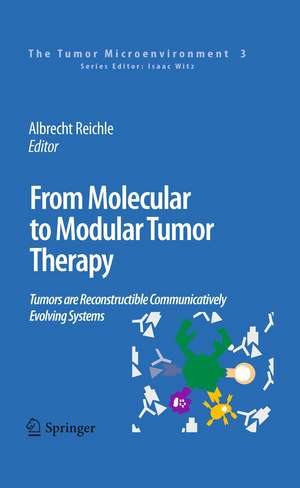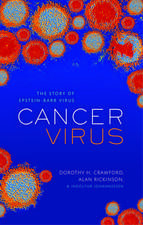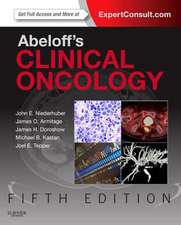From Molecular to Modular Tumor Therapy:: Tumors are Reconstructible Communicatively Evolving Systems: The Tumor Microenvironment, cartea 3
Editat de Albrecht Reichleen Limba Engleză Paperback – 6 noi 2012
| Toate formatele și edițiile | Preț | Express |
|---|---|---|
| Paperback (1) | 1424.89 lei 6-8 săpt. | |
| SPRINGER NETHERLANDS – 6 noi 2012 | 1424.89 lei 6-8 săpt. | |
| Hardback (1) | 1430.35 lei 6-8 săpt. | |
| SPRINGER NETHERLANDS – 10 sep 2010 | 1430.35 lei 6-8 săpt. |
Preț: 1424.89 lei
Preț vechi: 1499.88 lei
-5% Nou
Puncte Express: 2137
Preț estimativ în valută:
272.68€ • 283.07$ • 227.37£
272.68€ • 283.07$ • 227.37£
Carte tipărită la comandă
Livrare economică 22 martie-05 aprilie
Preluare comenzi: 021 569.72.76
Specificații
ISBN-13: 9789400733237
ISBN-10: 9400733232
Pagini: 568
Ilustrații: VIII, 568 p.
Dimensiuni: 155 x 235 x 33 mm
Greutate: 0.79 kg
Ediția:2010
Editura: SPRINGER NETHERLANDS
Colecția Springer
Seria The Tumor Microenvironment
Locul publicării:Dordrecht, Netherlands
ISBN-10: 9400733232
Pagini: 568
Ilustrații: VIII, 568 p.
Dimensiuni: 155 x 235 x 33 mm
Greutate: 0.79 kg
Ediția:2010
Editura: SPRINGER NETHERLANDS
Colecția Springer
Seria The Tumor Microenvironment
Locul publicării:Dordrecht, Netherlands
Public țintă
ResearchCuprins
Therapy-Derived Systems Biology: A Pragmatic Communication Theory.- Bridging Theory and Therapeutic Practice: From Generalized Disease Models to Particular Patients.- Tumor Systems Need to be Rendered Usable for a New Action-Theoretical Abstraction: The Starting Point for Novel Therapeutic Options.- Principles of Modular Tumor Therapy.- Tumors Share Common Processes During Tumor Evolution: Communicative Aspects of a Situation’s Interpretation for Creating Systems-Directed Therapies.- Cancer and Coagulation; Focusing on Tissue Factor and Heparanase.- The Role of Mesenchymal Cells in Cancer: Contribution to Tumor Stroma and Tumorigenic Capacity.- Shaping Tumor Associated Macrophages: The Role of NF-?B.- The Metabolic Achilles Heel: Tumor Cell Metabolism as Therapeutic Target.- Could Be Systems-Directed Therapy Approaches Promising in Glioblastoma Patients?.- Systems-Relevant Molecular and Cellular Targets: Implementation of Modular ‘Knowledge’.- Functional Impacts of Signal Integration: Regulation of Inflammation-Related Transcription Factors by Heterotrimeric G Proteins.- Molecular Cross-Talk Between Nuclear Receptors and Nuclear Factor-?B.- The Biomodulatory Capacities of Low-Dose Metronomic Chemotherapy: Complex Modulation of the Tumor Microenvironment.- Tumors are Evolvable Modular and Rationalized Systems: From Molecular to Modular Tumor Therapy.- Systems Biology: A Therapeutic Target for Tumor Therapy.- The Comparative Uncovering of Tumor Systems Biology by Modularly Targeting Tumor-Associated Inflammation.- Searching for the ‘Metabolism’ of Evolution.- Biomodulatory Therapy Approaches in Metastatic Cancer.- The Impact of Inflammation Control and Active Cancer Palliation on Metabolic Pathways Determining Tumor Progression and Patient Survival.-Pioglitazone and Rofecoxib Combined with Angiostatically Scheduled Capecitabine in Far-Advanced Hepatobiliary Carcinoma.- C-Reactive Protein As a Secretome-Derived Biomarker for Predicting Response to Biomodulatory Therapy in Metastatic Renal Clear Cell Carcinoma.- Modular Therapy Approach in Metastatic Castration-Resistent Prostate Cancer.- Systems-Directed Therapy in Metastatic Castration-Resistent Prostate Cancer (CRCP).- Criteria for Checking Systems Behavior and Creating Predictions: Systems-Associated Biomarkers and Molecular Imaging.- Early Detection of Systems Response: Molecular and Functional Imaging of Angiogenesis.- Secretome Proteomics, a Novel Tool for Biomarkers Discovery and for Guiding Biomodulatory Therapy Approaches.- Cyclooxygenase 2 (COX2) and Peroxisome Proliferator-Activated Receptor Gamma (PPARG) Are Stage-Dependent Prognostic Markers of Malignant Melanoma.- Pharmacological Considerations on Systems Biological Therapy Approaches.- Uncovering Tumor Systems Biology by Biomodulatory Therapy Strategies.- Breathing New Life into Old Drugs: Indication Discovery by Systems Directed Therapy.- Tumors’ Systems Biology: Implications for Personalized Therapy.- A Methodological Approach to Personalized Therapies in Metastatic Cancer.- Summary.- To Be an Object in a Biological System.- From Molecular to Modular, from Theme-Dependent to Evolution-Adjusted Tumor Therapy.
Textul de pe ultima copertă
The traditional problem of the poor presentability as well as diagnostic and therapeutic practicability of individual patient care is still unresolved. The present book aims at leading the reader (cancer researchers, pharmacologists, biologists) away―in a scientifically accessible manner―from the daily conflicts between theory and practice and between the generalized and individual tumor patient, so that more personalized diagnostic and therapeutic strategies can be developed for controlling metastatic tumor disease:•First, recording the systems concept of tumor biology based on rather different sciences (biochemistry, cell biology, and medical oncology) including their potential contribution to communication, •then, giving reductionistically derived systems features an internal communicative context (formal-pragmatic communication theory), and •finally, binding the systems features to (tumor-immanent) evolutionary processes (modularity of biochemical and cellular processes, rationalization of biologic functions).
Caracteristici
The holistic communicative structures of a tumor are now an experimentally and therapeutically accessible entity Communicatively-derived systems structures offer new but not teleologically preconceived insights into evolutionary processes, promoting tumor development and expansion into the 'metabolism' of tumor evolution The holistic communicative view allows a more abstract systems perspective of tumors Includes supplementary material: sn.pub/extras



















